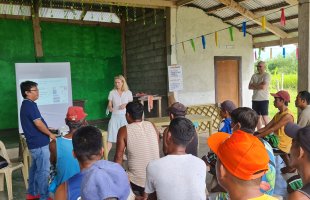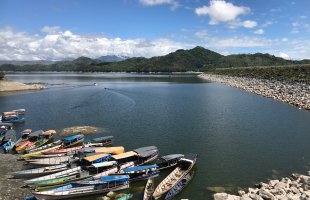HydroSun
Hydrosun aims to develop knowledge enabling efficient design and operation of hydro-FPV HyPPs.
%20(1).jpg?quality=80)
About the project
More specific objectives include, evaluate the added value of storage and increased forecasting accuracy over the lifetime of HyPPs, combine hydropower scheduling tools with FPV production forecasts for optimal hybrid operation, develop methods that enable lifetime predications of PV modules in FPV systems, and provide unique empirical field data for the environmental effects of FPV and hydro-FPV HyPPs.
The Green Platform project HYDROSUN is owned by Scatec and consists of two components, a competence project and an industry project.
- The HYDROSUN Competence Project (KSP HYDROSUN) is funded by the Research Council of Norway and headed by IFE. It includes the partners IFE, NTNU, The University of Oslo, NIVA, Hydro, Multiconsult, Statkraft, and in addition the partners of the Industry project.
- The Industry Project includes the partners Scatec, Prediktor, Ocean Sun, IFE and SINTEF Energi. It is headed by Scatec and funded by Innovation Norway, Scatec, Prediktor and Ocean Sun.
KSP Hydrosun arbeidspakker
The purpose is to establish knowledge, methods and models for design, dimensioning and operation of hybrid hydro solar power plants.
The purpose is to facilitate for operation and maintenance of hydropower plants for hybrid operation.
The purpose is to build knowledge for a Norwegian FPC industry with reduced risks and increased reliability.
The purpose is to assess environmental and societal considerations of hydro-FPV HYPPs.
NIVA's role
NIVA is in the project responsible for the work package addressing environmental and societal considerations of hydro FPV HYPPS. The work package includes 4 research questions.
- How does FPV impact the local environment? Effects of FPV on physical parameters, such as water evaporation, water temperature are measured.
- What is the impact of FPV HyPPs for socio-economic aspects? Water and land use conflicts and trade-offs, and links between environmental impacts and socio-economic issues are addressed.
- How can negative impact be mitigated, and co-benefits be enhanced?. Potential co-benefits and means to mitigate the negative impacts identified are explored.
- Greenhouse gas (GHG) emissions.. The potential impact of FPV on GHG processes and fluxes, and eventual impacts from changes in hydro operations are investigated by the G-res tool.
Approach
- Data collection: including temperature sensors, oxygen, water chemistry and phytoplankton monitoring.
- Process-based modelling of reservoir with and without FPV cover: evaporation, water temperature, oxygen, and phosphorus concentrations.
- Empirical modelling of greenhouse gas emissions
- Key informant interviews and focus group discussions for identification of water users and uses, and associated indicators.
- Workshops with industry partners to discuss actions to reduce adverse impacts and to increase co-benefits.
 Ingrid Nesheim
Ingrid Nesheim
.jpg)


